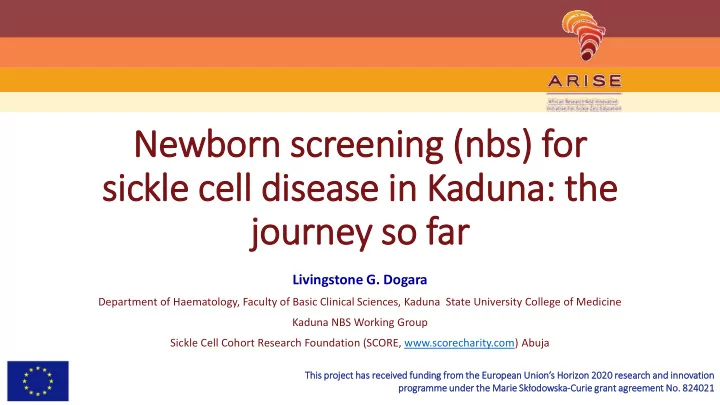

Newborn screening (nbs) for sic ickle cell dis isease in in Kaduna: the journey so far jo Livingstone G. Dogara Department of Haematology, Faculty of Basic Clinical Sciences, Kaduna State University College of Medicine Kaduna NBS Working Group Sickle Cell Cohort Research Foundation (SCORE, www.scorecharity.com) Abuja This project has received funding from the European Union’s Horizon 2020 research and innovation programme under the Marie Skłodowska -Curie gr grant agr agreement No. o. 82 8240 4021 21
Affi filiations/Conflict of f In Interest • Affiliations • Kaduna State University • Barau Dikko Teaching Hospital • Africa Research and Innovative Initiative for Sickle Cell Education (ARISE) • Sickle Cell Cohort Research Foundation (SCORE, www.scorecharity.com) Abuja • The Sickle Pan-African Research Consortium (SPARCO) • Haemophilia Foundation of Nigeria • Conflict of interest • None
BDTH-KASU Haematology • Inpatient services for paediatrics sickle persons • Inpatient services for adult sickle persons
In Introduction • What is the aim of the session? • Effective communication and collaboration • What will be covered in the session? • Journey so far • Little but giant steps
Screening • Screening is defined as: “a public health service in which members of a defined population, who do not necessarily perceive they are at risk of, or are already affected by, a disease or it’s complications, are asked a question or offered a test to identify those individuals who are more likely to be helped than harmed by further tests or treatment to reduce the risk of disease or it’s complication” Second Report of the UK National Screening Committee
Newborn Screening Why screen newborns for sickle cell disease? • Early administration of prophylactic penicillin markedly reduces the incidence of pneumococcal sepsis • Clinical monitoring reduces morbidity and mortality • Neonatal screening for β -thalassaemia major and other thalassaemias useful but less important
Newborn Screening: Outcome Overall outcome to be achieved • Mortality rate in children of under 5 of less than 2 deaths per 100 affected infants Others • Cascade family screening • To target at risk families and offer future genetic choice • To allow better Health Service resource planning
Nigeria Demography Population Est. 200.96m (2019 proj.) Population Growth Rate: 2.6% (2017 est.) Birth Rate: 38.89 births/1000 births SCD births: >150,000/year in Nigeria Death Rate: 12.4 deaths/1,000 population (2017 est.) Inusa, et al., Pediat Therapeut 2015, 5:3 DOI: 10.4172/2161-0665.1000262 https://nigerianstat.gov.ng › download
Population Est. 8.9m (2019 proj.) Population Growth Rate: 2.6% (2017 est.) Birth Rate: 38.89 births/1000 births Delivery by health professionals: 40.4% Delivery without assistance: 28.8% Facility based delivery rate: 32.4% Antenatal visit attendance: 30% (2008), 43.8% (2017) Kaduna Pilot NBS (2010-2011): 4000 babies Inusa, et al., Pediat Therapeut 2015, 5:3 DOI: 10.4172/2161-0665.1000262 https://kdbs.ng/app/uploads/2019/06/KADUNA-STATE-SDGs-WATCH-1.pdf https ://nigerianstat.gov.ng › download
Kaduna Sic ickle Cell Screening Programme – The id ideal 1) Antenatal Screening Programme AIM: Identify mothers at risk of having an affected fetus -High Prevalence (fetal prevalence SCD ≥1.5 / 10,000 pregnancies) -Low Prevalence (fetal prevalence SCD <1.5 / 10,000 pregnancies) 2) Newborn screening Programme -Universal AIM: identify babies affected by SCD 3) Prenatal Diagnosis and DNA diagnostic services ARISE AIM: To give a definitive diagnosis
Li Little but t Giant Steps • 2009-2011: Pilot Study, Katsina/Kafanchan/London Sickle Cell Nigeria Focus Group (Inusa, et al., Pediat Therapeut 2015, 5:3 DOI: 10.4172/2161-0665.1000262) • 2013: NBS reagents exhausted • 2014: Line of communications opened with KDSG • 2016: ASH, AfroSicklenet, ASCAT (J Trop Dis Public Health. 2018; 6(2): 26) • 2017-2018: Collaboration with partners • 2019: RCPath LabSkill Africa/IEF CESTRA Installation training • 2020: ASH CONSA
What do you want to know? Social-economic-environmental impacts Source: Bennett and Rockwell, 1995, Targeting Outcomes of Programs
2009-2017 Plan lannin ing Meetin ings – Katsin ina/Kafanchan/London SC SCD Nig igeria ia Focus Group FGD 2017
ARISE/EHA: 2018-2019
Call ll to Actio ion: ASH Assessment vis isit it/LabSkill ll Afric ica 2018-2019
Ongoing ▪ Regular training workshops ▪ Policy review and updating ▪ Incident reporting and review ▪ Collection and review of key performance indicators ▪ Linking newborn and antenatal screening results ▪ Newborn outcomes project
Successes • Government support and program approval • MoU between SCORE and KDSG • Academic and other partner support (BDTH, KASU, ABU, ABUTH, MOH, SPHCDA, Fantsuam Foundation, SSCF) • ASH CONSA support • ARISE Exchange/RCPAth LabSkill Africa Standardization of diagnosis and care • Use of tools in management
Futuristic • Ability to design a framework of inter-agency and intra-agency collaboration • Being ready for partnership and collaboration (ASH education programme, BSH, Academic institution) • Influencing national decision on guidelines for care of the sickle • Develop framework/curriculum for holistic sickle care (Genetic counselling, school screening, pre-marital counselling) • To use framework in standardizing care of other genetic disorders
Policy Framework
“There is no passion to be found playing small - in settling for a life that is less than the one you are capable of living.” Nelson Mandela la Former President of South Africa
Thank You
This is presentation reflects only the author(s)’s view and the EU Research Executive Agency (R (REA) is is not responsible for any use that may be made of f the it contains . information it in This project has received funding from the European Union’s Horizon 2020 research and innovation programme under the Marie Skłodowska -Curie gr grant agr agreement No. o. 82 8240 4021 21
Recommend
More recommend